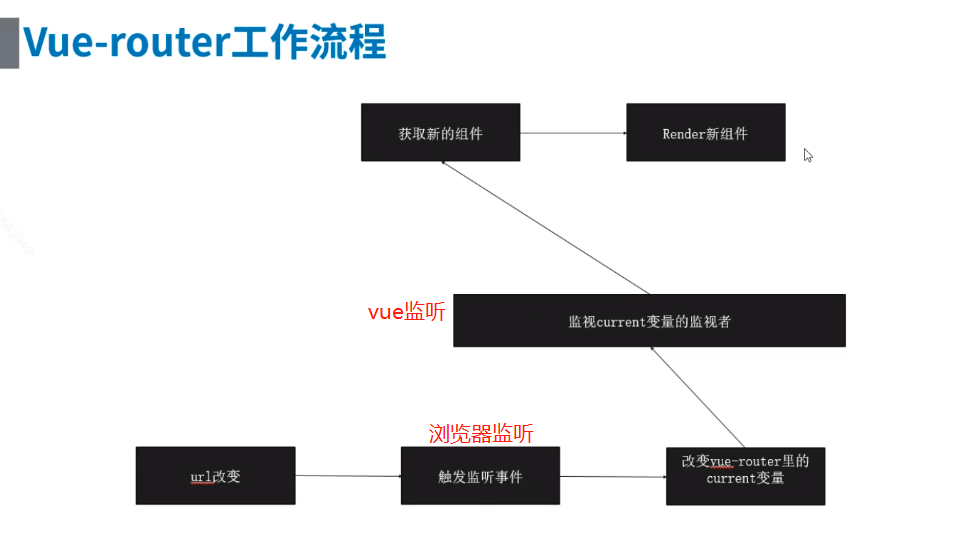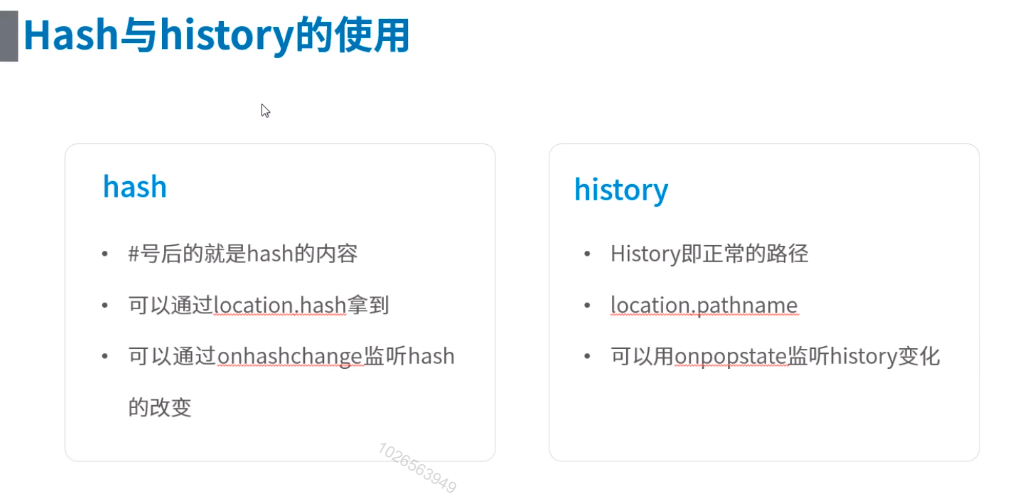前端路由和后端路由
后端路由: 输入url -> 请求发送到服务器 -> 服务器解析请求的路径 -> 拿到对应页面 -> 返回出去 前端路由: 输入url -> js解析地址 -> 找到对应地址的页面 -> 执行页面生成的js -> 看到页面


1、Hash 和 History

vue插件的基础知识 -- 如何检测vue外部的对象,插件等。。。
// The Vue build version to load with the `import` command // (runtime-only or standalone) has been set in webpack.base.conf with an alias. import Vue from 'vue' import App from './App' import router from './router' import { create } from 'domain' Vue.config.productionTip = false var test = { //独立于vue外的对象 testa: 1 } setTimeout(() => { //独立于vue外的操作 test.testa = 3333333; }, 2000); function f1(){ console.log('f1-----------') } f1.install = function(vue){ console.log('添加了install属性,,执行install中方法,,不再打印f1-----------') console.log(vue) //打印的是vue这个类,和import一样的类 //全局混入vue实例 console.log(vue.util); //vue一系列api vue.util.defineReactive(test, 'testa'); console.log('util.extend----', vue.util.extend); console.log('extend------', vue.extend) vue.mixin({ data(){ return { c: 'this is mixin in c', } }, //定义一些公共方法 methods: { golableMethod(){ console.log('调用了mixin混入的全局方法--golableMethod') } }, beforeCreate: function(){ //为什么在beforeCreate中注入,,因为created时data已经生成,再注入已经晚了 this.test = test //这样就可以监听vue外的对象 }, //最关键的还是混入生命周期 created: function(){ console.log('i am mixin混入的created') //打印了三个 i am mixin混入的created //1、new Vue({}) 2、app.vue 3、HelloWorld.vue console.log(this) //this指的是当前组件 } }) } f1.c = function(){console.log('f1的c方法,,,')} /** * vue.use() ---把给vue的东西执行一遍 * 如果给的是个方法,那么他会直接执行这个方法 * 如果给的给的东西里面有个install属性,那么会执行install * 为什么不直接调用要执行的方法,而要使用install, ==》因为install方法中可以传递vue参数,, */ Vue.use(f1) /* eslint-disable no-new */ new Vue({ el: '#app', router, components: { App }, template: '<App/>' }) /** * vue的工具属性 * vue.util = { * warn: function(){}, * extend: function(){}, * mergeOptions: function(){}, * defineReactive: function(){} * } */ /** * vue.util.extend 和 vue.extend 区别 * vue.util.extend --- 拷贝 * vue.extend --- 可以在任何地方拿到任何组件 */
2、路由原理
class HistoryRoute{ constructor(){ this.current = null; } } class vueRouter { constructor(options){ this.mode = options.mode || 'hash'; this.routes = options.routes || []; this.history = new HistoryRoute; this.routesMap = this.createMap(this.routes) this.init() } init(){ if(this.mode == 'hash'){ location.hash ? '' : location.hash = '/'; window.addEventListener('load', ()=>{ this.history.current = location.hash.slice(1); }) window.addEventListener('hashchange', ()=>{ this.history.current = location.hash.slice(1); }) }else{ location.pathname ? '' : location.pathname = '/'; window.addEventListener('load', ()=>{ this.history.current = location.pathname; }) window.addEventListener('popstate', ()=>{ this.history.current = location.pathname; }) } } createMap(routes){ return routes.reduce((memo, current)=>{ memo[current.path] = current.component; return memo; },{}) } } vueRouter.install = function(Vue){ Vue.mixin({ beforeCreate(){ if(this.$options && this.$options.router){ this._root = this; this._router = this.$options.router; Vue.util.defineReactive(this, 'current', this._router.history) }else { this._root = this.$parent._root } } }) Vue.component('router-view', { render(h){ let current = this._self._root._router.history.current; console.log(current) let routesMap = this._self._root._router.routesMap; console.log(routesMap) return h(routesMap[current]) } }) } export default vueRouter